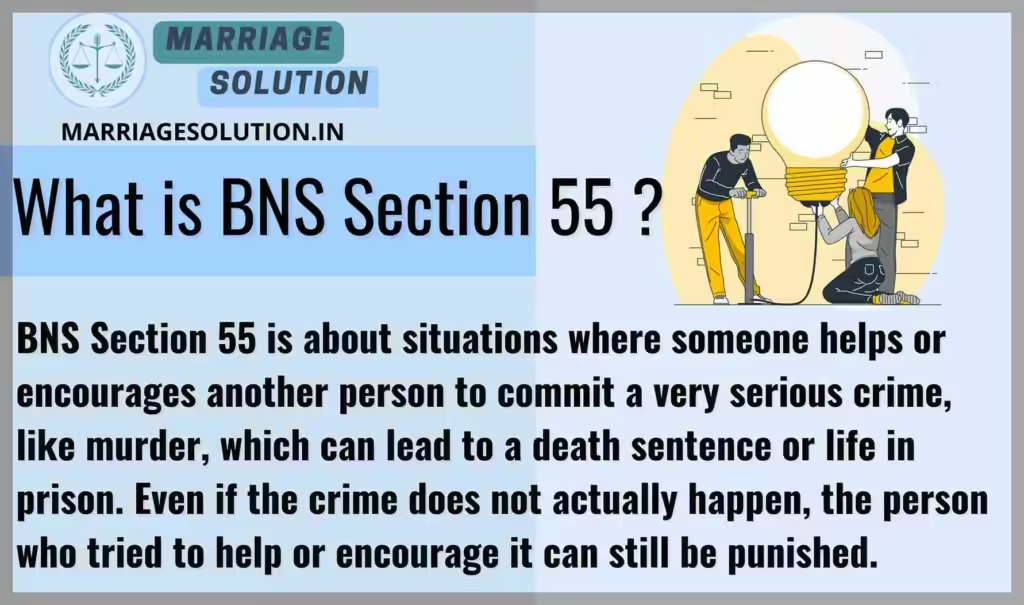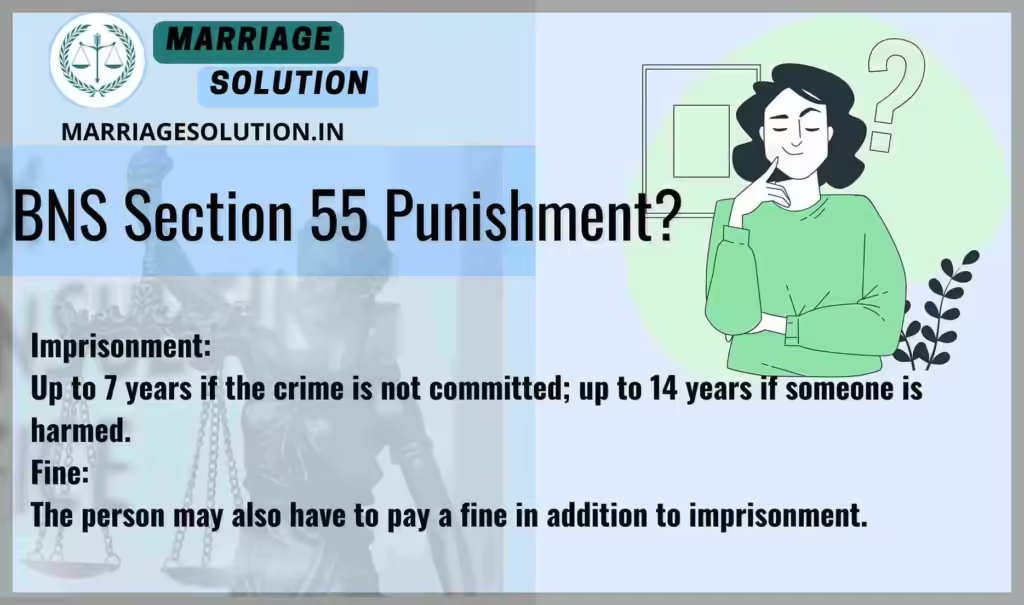Introduction of 55 BNS
55 BNS addresses situations where someone encourages or helps in a crime that could lead to the death penalty or life imprisonment. Even if the crime doesn’t actually happen, the person who encouraged it can still be punished. This section ensures that those who push others towards serious crimes face consequences, even if the crime doesn’t end up being committed.
The Bharatiya Nyaya Sanhita (BNS) Section 55 replaces the old Indian Penal Code (IPC) Section 115.
- Introduction of 55 BNS
- What is section 55 of BNS ?
- BNS Section 55 in Simple Points
- Section 55 BNS Overview
- BNS 55 Punishment
- BNS 55 bailable or not ?
- Bharatiya Nyaya Sanhita Section 55
- BNS Section 55 FAQs
- If you need support with court proceedings or any other legal matters, don’t hesitate to reach out for assistance.
What is section 55 of BNS ?
BNS Section 55 is about situations where someone helps or encourages another person to commit a very serious crime, like murder, which can lead to a death sentence or life in prison. Even if the crime does not actually happen, the person who tried to help or encourage it can still be punished.

BNS Section 55 in Simple Points
Whoever abets the commission of an offence punishable with death or imprisonment for life, if that offence be not committed in consequence of such abetment, shall be punished with imprisonment of either description for a term which may extend to seven years, and shall also be liable to fine.
1. Meaning of Abetment of Serious Offence
- Abetment → Encouraging, instigating, aiding, or conspiring with another to commit a crime.
- Offence punishable with death or life imprisonment → The gravest crimes like murder, terrorism, waging war against the state, etc.
- Even if the offence is not actually committed, the abettor is still guilty under this section.
Example: A persuades B to kill C. B refuses. A is still guilty under Section 55.
2. Essential Ingredients
For the offence under Section 55, the following must exist:
- There must be an act of abetment (instigation, conspiracy, or aiding).
- The abetment must relate to an offence punishable with death or life imprisonment.
- The main offence is not carried out.
- The abettor’s intention to commit the serious crime must be clear.
Example: A gives B a gun and asks him to kill a rival. B refuses. → A has committed an offence under Section 55.
3. Punishment under BNS Section 55
- Imprisonment → Up to 7 years.
- Fine → The offender will also be liable to pay fine.
- Both → The Court can impose both imprisonment and fine depending on gravity.
This ensures that even failed attempts at encouraging serious crimes are punished.
4. Nature of the Offence
- Cognizable → Police can register FIR and investigate without Magistrate’s order.
- Non-Bailable → Bail is not a matter of right, must be granted by court.
- Non-Compoundable → Cannot be privately settled between parties.
- Triable by → Court of Session (higher court due to seriousness of offence).
5. Examples of BNS Section 55 in Action
- Example 1 – Instigation without Result
A tells B to commit murder. B refuses. A → guilty under Section 55. - Example 2 – Conspiracy without Execution
A and B plan to bomb a building. Police arrest them before they act. → punishable under Section 55. - Example 3 – Not an Offence
A jokingly says “You should kill him” without intention or serious abetment. B laughs and ignores. → Not punishable under Section 55 (no real abetment).
6. Importance of Section 55
- Prevents serious crimes at the planning stage.
- Ensures that even failed attempts to provoke grave offences are punishable.
- Acts as a deterrent against conspiracies and instigations.
- Balances justice by punishing abettors even when the main offence is not carried out.
Section 55 BNS Overview
BNS Section 55 explains that if someone helps or pushes another person to commit a crime that could lead to death or life imprisonment, they can be punished even if the crime isn’t carried out. If the crime does happen, or if someone is hurt because of the abetment, the punishment becomes even more severe. This law ensures that those who encourage others to commit serious crimes are held accountable, regardless of whether the crime is completed or not.
10 Key Points of BNS Section 55
1. Abetment Defined
Abetment means helping, provoking, or persuading someone to commit a crime. Under this section, it specifically refers to abetting serious crimes like murder, terrorism, or other grave offences. A person does not need to actually commit the crime to be guilty—the act of abetment itself is a crime.
2. Serious Crimes Covered
Section 55 applies only to the most serious offences—those punishable by death or life imprisonment. These include crimes like murder, terrorist activities, treason, or violent organized crimes. This shows how strictly the law views attempts to promote such offences.
3. Punishment Even if Crime Doesn’t Happen
One of the strongest aspects of this section is that it punishes abettors even if the actual crime never happens. The law looks at the intention and effort to push someone towards a grave offence, not just the outcome.
Example: If A instigates B to commit murder but B refuses, A is still guilty under this section.
4. Standard Punishment
If the crime is not actually committed, the abettor can still face imprisonment up to 7 years along with a fine. This ensures that attempts to push others into committing dangerous crimes are strictly discouraged.
5. Harsher Punishment if Someone Gets Hurt
If abetment of a serious crime results in someone getting hurt, the punishment becomes harsher. In such cases, the abettor can face up to 14 years of imprisonment plus a fine. This reflects how the law increases punishment when real harm is caused, even if the main crime isn’t completed.
6. Non-Bailable Offence
Offences under Section 55 are non-bailable. This means that a person accused of abetting such crimes cannot easily get bail from the police and must approach the court. This restriction highlights the seriousness of the crime.
7. Non-Compoundable Offence
The offence is non-compoundable, which means it cannot be privately settled between parties. Once abetment of a serious crime is proven, the case must go through the court process. Society, not just the victim, has an interest in punishing such offenders.
8. Tried in Court
Cases under Section 55 are handled by the same courts that try the main offence. For example, if the abetment relates to murder, the case will be heard in a sessions court, just like a murder trial. This ensures consistent treatment of abettors and offenders.
9. Focus on Intent
The most important part of Section 55 is that it focuses on the abettor’s intention. Even if their plan fails or the crime never takes place, the very fact that they tried to encourage such a grave crime is enough to bring legal punishment.
10. Legal Accountability
BNSS Section 55 ensures that no one can escape responsibility by saying, “But the crime didn’t happen.” The law holds abettors accountable for their dangerous actions, making sure that pushing others into life-threatening crimes is itself treated as a serious criminal act.
BNS 55 Punishment
Imprisonment:
Up to 7 years if the crime is not committed; up to 14 years if someone is harmed.
Fine:
The person may also have to pay a fine in addition to imprisonment.

BNS 55 bailable or not ?
BNS Section 55 is not bailable, which means the person accused cannot easily get out of jail by paying bail.
Bharatiya Nyaya Sanhita Section 55
| Section | Offense | Punishment | Bailable / Non-Bailable | Cognizable / Non-Cognizable | Trial By |
|---|---|---|---|---|---|
| BNS Section 55 | Abetment of an offence punishable with death or life imprisonment, if the offence is not committed in consequence of the abetment. | Imprisonment up to 7 years and fine. | Non-Bailable | Cognizable | Court of Session |
| IPC Section 115 (Old) | Abetment of an offence punishable with death or imprisonment for life, if the offence is not committed in consequence of the abetment. |
Imprisonment up to 7 years and fine. (Same as BNS 55, but BNS adds clarity on procedural aspects). |
Non-Bailable | Cognizable | Court of Session |
BNS Section 55 FAQs
What is BNS Section 55 about?
It covers situations where someone encourages or helps in a crime that could lead to death or life imprisonment.
Can someone be punished under BNS Section 55 even if the crime isn’t committed?
Yes, the person who encouraged the crime can still be punished.
What happens if someone gets hurt because of the abetment?
The abettor can face up to fourteen years in prison and a fine.
Is the offence under BNS Section 55 bailable?
No, it is a non-bailable offence.
Conclusion
BNS Section 55 is a powerful provision that deals with the abetment of offences punishable with death or life imprisonment. It makes sure that even if the main crime is not actually committed, the person who encouraged or helped in such a grave offence is still legally accountable. This section focuses on intention, prevention, and strict punishment, ensuring that abettors cannot escape by claiming “the crime never happened.”
By replacing IPC Section 115, BNS Section 55 brings stricter penalties, clear definitions, and stronger deterrence against those who promote or assist in serious crimes like murder, terrorism, or violent offences.
In simple words, this law protects society by making abettors equally responsible for dangerous acts, whether or not the offence is carried out. It strengthens justice, prevents misuse, and ensures that the law treats abetment of serious crimes with the gravity they deserve.
Need Legal Support?
If you are dealing with court cases, marriage problems, or any other legal issue, our team at Marriage Solution – Lawyer Help is here for you. Simply fill out our quick online enquiry form, and we’ll connect you with the right legal expert to support your needs.
Finished with BNS 55 ? Continue exploring the next provisions of the Bharatiya Nyaya Sanhita (BNS), 2023. Each section includes explanations, examples, and plain-language breakdowns for easy understanding.
- BNS 56 : Abetment of offence punishable with imprisonment
https://marriagesolution.in/bns_section/bns-56/ - BNS 57 : Abetting commission of offence by the public or by more than ten persons.
- https://marriagesolution.in/bns_section/bns-section-57/
- BNS 58 : Concealing design to commit offence punishable with death or imprisonment for life.
- https://marriagesolution.in/bns_section/bns-section-58/
- BNS 59 : Public servant concealing design to commit offence which it is his duty to prevent .
- https://marriagesolution.in/bns_section/section-59-bns/
- BNS 60 : Concealing design to commit offence punishable with imprisonment .
- https://marriagesolution.in/bns_section/section-60-bns/
Full IPC Section List: https://marriagesolution.in/ipc-section-list
All Indian Law & Blogs: https://marriagesolution.in/indian-law/
Full BNSS Section List: https://marriagesolution.in/bnss_section-list
